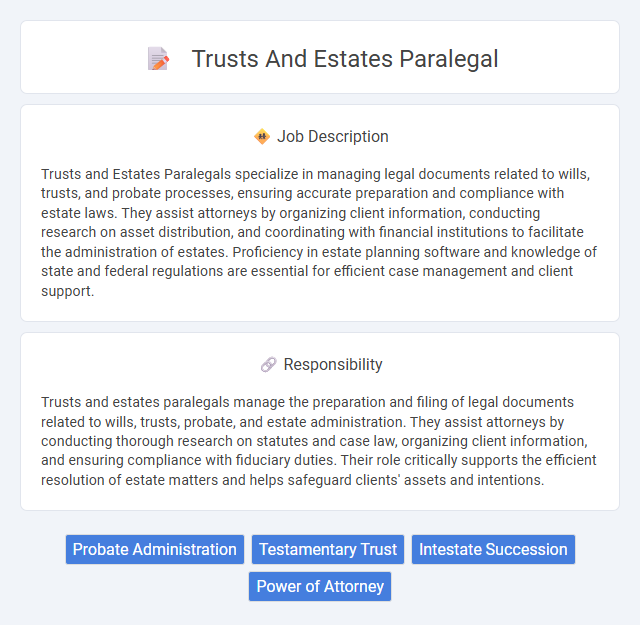
Trusts and Estates Paralegals specialize in managing legal documents related to wills, trusts, and probate processes, ensuring accurate preparation and compliance with estate laws. They assist attorneys by organizing client information, conducting research on asset distribution, and coordinating with financial institutions to facilitate the administration of estates. Proficiency in estate planning software and knowledge of state and federal regulations are essential for efficient case management and client support.
Individuals with strong organizational skills and attention to detail are likely to be well-suited for a Trusts and Estates Paralegal position due to the complexity of legal documents involved. Those who find comfort in handling confidential information and working within strict deadlines may have a higher probability of thriving in this role. Conversely, people who struggle with meticulous paperwork or prefer less structured environments might find this job challenging.
Qualification
Trusts and Estates Paralegals must possess a strong foundation in probate law, estate planning, and fiduciary duties, often demonstrated through specialized certifications such as the National Association of Legal Assistants (NALA) Trusts and Estates Specialty. Proficiency in drafting wills, trusts, and powers of attorney, combined with exceptional organizational skills and attention to detail, is essential for managing complex estate documentation. Experience with estate administration, including asset inventory, tax filings, and court procedures, further qualifies candidates for advanced roles in this legal sector.
Responsibility
Trusts and estates paralegals manage the preparation and filing of legal documents related to wills, trusts, probate, and estate administration. They assist attorneys by conducting thorough research on statutes and case law, organizing client information, and ensuring compliance with fiduciary duties. Their role critically supports the efficient resolution of estate matters and helps safeguard clients' assets and intentions.
Benefit
A Trusts and Estates Paralegal role likely offers the benefit of gaining specialized expertise in estate planning and fiduciary administration, enhancing career prospects in the legal field. This position probably provides opportunities to work closely with attorneys and clients, improving practical knowledge and professional networking. The structured environment of this job may also contribute to developing strong organizational and research skills, essential for handling complex legal documents and procedures.
Challenge
A Trusts and Estates Paralegal may face the challenge of managing complex legal documents and ensuring strict compliance with evolving state and federal regulations, which requires meticulous attention to detail. Navigating intricate family dynamics and resolving disputes often demands both legal knowledge and diplomatic skills. There is a likelihood that balancing multiple cases simultaneously can create time management pressures in this role.
Career Advancement
Trusts and estates paralegals gain specialized expertise in managing legal documentation, probate processes, and estate administration, positioning themselves for advancement into senior paralegal roles or estate planning consultants. Proficiency in tax laws, fiduciary responsibilities, and client communication enhances opportunities for promotion within law firms or financial service companies. Pursuing certifications such as the Certified Paralegal (CP) or National Association of Legal Assistants (NALA) Advanced Trusts and Estates specialization accelerates career growth and increases marketability.
Key Terms
Probate Administration
A Trusts and Estates Paralegal specializing in Probate Administration manages the legal process of validating wills and distributing assets according to the decedent's wishes. They prepare and file necessary court documents, coordinate with executors and beneficiaries, and ensure compliance with state probate laws. Expertise in asset inventory, creditor claims, and estate tax filings is essential for efficient estate settlement.
Testamentary Trust
A Trusts and Estates Paralegal specializing in Testamentary Trusts manages legal documentation, ensures compliance with estate planning regulations, and assists in the administration of trusts created upon a testator's death. Expertise in interpreting wills, coordinating with executors, and preparing trust accountings is essential for accurate and efficient trust management. Proficiency in legal research and communication with beneficiaries supports the successful execution of testamentary trust provisions.
Intestate Succession
Trusts and estates paralegals specializing in intestate succession manage cases where individuals pass away without a valid will, ensuring asset distribution complies with state laws. They assist in identifying heirs, preparing legal documents, and facilitating court procedures to administer the decedent's estate effectively. Expertise in probate law and local intestacy statutes is essential for navigating complex inheritance issues and protecting beneficiaries' rights.
Power of Attorney
A Trusts and Estates Paralegal specializing in Power of Attorney handles the preparation, review, and execution of POA documents, ensuring legal compliance and client authorization for financial or healthcare decisions. Responsibilities include researching state-specific regulations, coordinating with attorneys, and maintaining accurate records to safeguard clients' interests. Expertise in POA forms enhances estate planning efficiency and supports the seamless management of trusts and estates.
 kuljobs.com
kuljobs.com